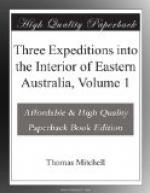FORCED MARCH TO THE GWYDIR.
February 8.
In our line of route back to the Gwydir we knew by experience that no water was to be found. The distance to that river from our present camp was twenty-three miles; but I considered it better to cross this dry tract by a forced march in one day than to pass a night without water. By this arrangement we could halt on the river during the day following to recover and refresh the cattle after so long a journey. We were accordingly in motion at half-past 5 A.M., and the early part of the morning being rather cool we got forward very well. After midday the weather was very hot. At four P.M. the bush of one of the wheels became so loose that the cart fell down, and it was necessary to repair the wheel before it could proceed. Mr. White undertook this with the aid of some of the men, while I continued the journey with the rest; and it may be imagined how cleverly the work was done from the fact that my zealous assistant overtook us with the cart before we reached the end of the day’s journey.
We perceived smoke arising before us when we had arrived within six miles of our old encampment on the Gwydir, and soon after we found the grass burning on both sides of our line of route, which, it should be observed, had been marked by us throughout on advancing into this country, not only by the wheel tracks in the soft soil, but also by chipping the trees on both sides with an axe.
NUMEROUS TRIBES SURROUND THE PARTY.
We now found the track of wheels almost obliterated by the prints of naked feet, as if a great number had followed us, or rather Mr. Finch. A long-continued cooey was at length heard at a distance, apparently the signal of our arrival, and from the confused sounds which followed, and smoke ascending in various places, it was evident that a numerous tribe was awaiting us. The wearied cattle reached the river just after the sun had gone down. The crossing place was extremely bad, and the poor cattle had accomplished a wonderful day’s work; nevertheless I considered it necessary, whatever efforts it might cost us, to encamp on the other side. That bank afforded an admirable position on which I could with safety halt the next day and guard our cattle within a fine turn of the river; whereas the side on which we were was particularly exposed to annoyance if the natives became troublesome; and it did not command any favourable run for the cattle which might thus have strayed back towards the Karaula. Our lightest cart, which was the first, stuck fast in the bed of the river, the tired bullocks being unable to draw it further. The moon was about five days old, and with the assistance of its light everything was carried across by the men, so that by nine o’clock we had established our camp where I wished, the empty carts alone remaining on the bank which we had left. The party had been travelling and working hard without intermission during 16 hours, some men not having even breakfasted: but the next morning unveiled to them more clearly the advantages gained by these exertions.




